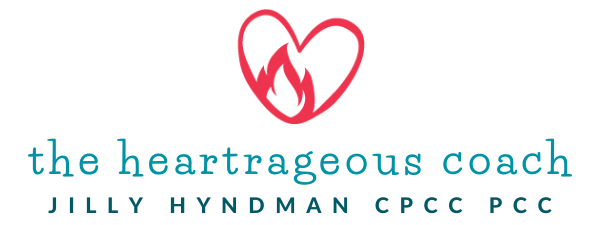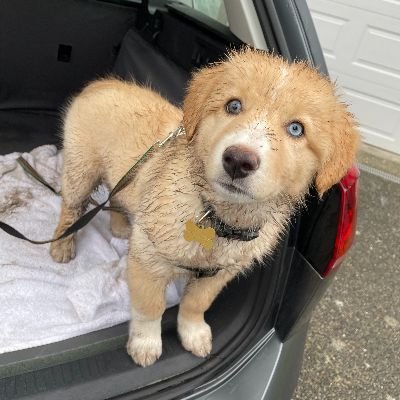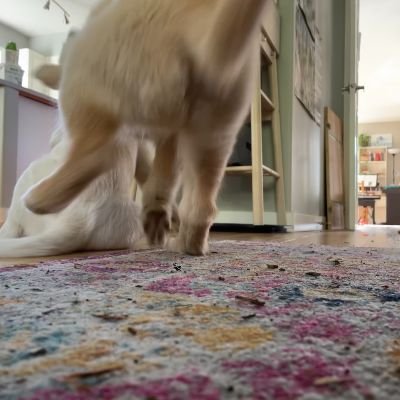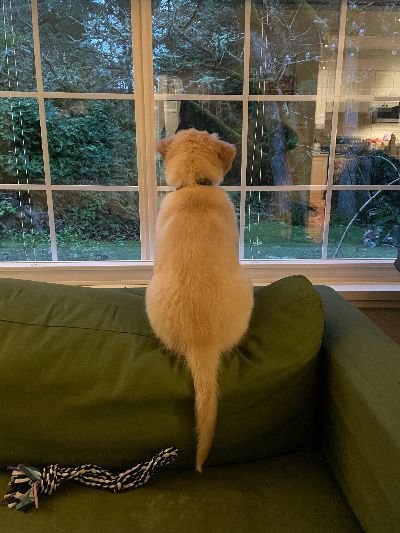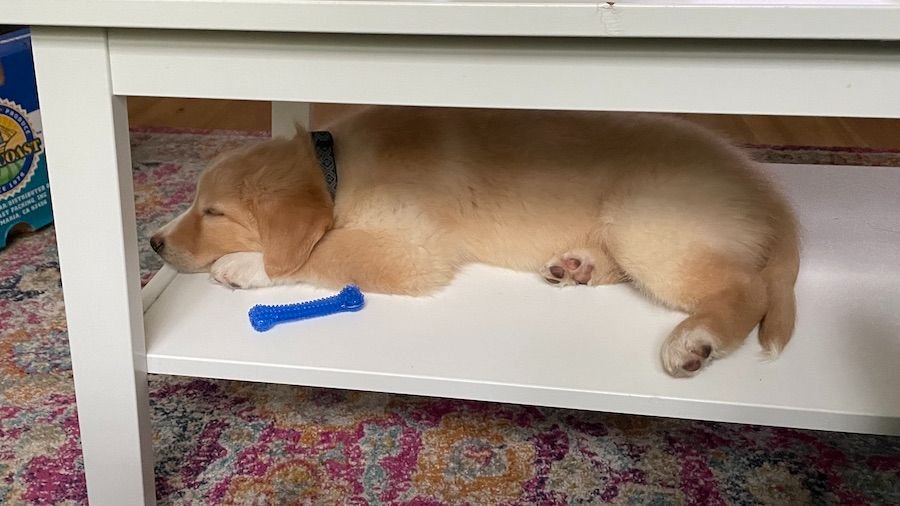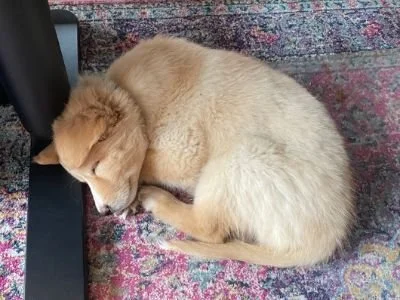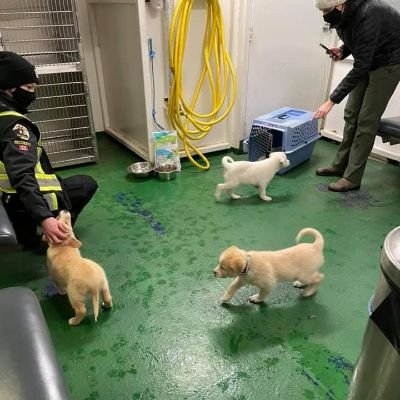Updated Puppy Wisdom - Day 6
Day 6: Enjoy the Mess
Welcoming a puppy to your world also invites in a huge mess. Rather than be annoyed by it and resist it, here's your invitation to enjoy it!
Insider tip: Puppies are messy.
They get muddy and leave a trail of paw prints all over your newly cleaned floors and furniture and your pants when they jump on you.
Their toys can end up scattered all over the place, only to be stepped on (ow!) or tripped over when you're letting the pup out in the middle of the night.
They can shred sticks and leave bark and splinters all over your house, or haul in other treasures from the yard to destroy.
And don't even get me started on the bodily fluid messes they create -- slobber, pee, poo, upchuck when they eat something nasty off the street. Ewww, boy! So. Gross.
If you prefer a tidy home (or life) with no debris (physical or emotional) strewn about, then a puppy may not be for you. Or, it may be exactly the thing for you!
If you want to examine why it is that you don't like a mess, then you can borrow my puppy for an afternoon. Notice what a mess brings up in you: resistance? anxiety? anger? something else?
What's that about?
If a chaotic mess is something you can't be with, a puppy can help you get explore that. (Disclaimer for clarity: I do NOT recommend getting a puppy JUST to explore this; if you get one, please be intentional and consider all aspects of pet ownership, not just your own growth journey.)
One of the great personal growth opportunities in our lives is learning to be with what we can't (or choose not to) be with.
By being with what's uncomfortable, disliked or unwanted, we grow our capacity for empathy, for tolerance, for presence. We become better able to roll with what shows up in our lives, especially the hard stuff. We take power away from the thing we can't be with and reclaim it for ourselves.
And, you may even discover that you actually like something you previously thought you didn't. (Ever tried a food later in life that you despised as a kid, and found out you like it?)
And besides, a mess can be cleaned up later.
It's the aspect of later that is the gift of a mess: it gives you permission to be present in the messiness and find the joy in the experience. Get muddy (or covered in paint, or dress-up clothes, or cookie batter) right alongside your puppy (or kid or spouse or friend or self).
Have some fun. Be in the messy moment, and look for the joy.
The Rest of Our Lives
So, what lessons can be applied to the rest of our lives, whether or not we have a puppy in our homes? Here are some questions that may help you consider where you can allow and be with the mess in your life.
Our Households and Families
Where is avoiding a mess actually getting in the way of connection, fun and joy in your household?
Where could you allow or invite in a little more mess?
Our Businesses and Workplaces
How could you create space for messiness in your work practices, as a way to foster creativity, connection and ease stress?
Ourselves
What are you avoiding or resisting that's messy in your life right now?
How could learning to be with that mess help grow you?
What else?
Where else are you seeing resistance to the mess in your life? Share your thoughts with me by replying, or posting on my social channels. Let’s keep this conversation going.
The bottom line: Don't let the mess of life distract you from the joy.
Puppy Update:
Puppy-induced literal messes still abound in our house and car and on our pants and jackets…especially now that we’re back into the rainy fall weather. And, I’ve made space for more messiness, less constraint and perfection, over the past year, too, especially when it comes to parenting. As parents of little people, some of us tend to swoop in and fix, remove discomfort and anticipate needs (and wants). Too much of that means kids don’t learn to figure it out for themselves. I’ve pulled waaaay back on my tendency to keep things organized and, ahem, controlled, for the sake of letting things slide and be messy, in the interest of enabling growth and figure-it-out-ability in our kid. It’s not always pretty, but it’s good.
Updated Puppy Wisdom - Day 5
Day 5: Redefine Success
When you welcome a new puppy to your home -- or integrate any change in your life -- it's helpful to define, and perhaps redefine, success.
Our life before a puppy was fairly "successful."
What I mean by that is our family's life was hitting most of the marks that we'd established as ideal, desired and intended.
For example, we'd established a rhythm to our days and weeks that fit our wants: sleeping (and waking) when we wanted; going for hikes almost every weekend; enjoying time in and out of our home at will; leaving belongings (mundane or cherished) on the coffee table for awhile before finding their true home.
We were able to work from home in two different spaces to ensure noise was minimal and client calls weren't interrupted with family life.
Over the years, we've lived through the challenges of a newborn baby, the toddler years, changing jobs, big losses, scary diagnoses, a move across the country.
Right now, we are healthy, mostly happy and doing okay by most standards. Success!
Before Suzanne showed up, when she was just a possibility, we discussed what Big S Success (our ultimate goal) would look like: a well-mannered, well-socialized dog who fit into our lifestyle and household. Specific measures of success include being good with all kinds of people; not being a barker; being confident and assertive without being aggressive; not begging at the table; being kennel trained.
When Suzanne first showed up in our life, we needed to adjust our immediate definition of success, our Small S Success, in order to keep things in perspective AND moving toward our ultimate measures of Big S Success.
Otherwise, we'd be defeated.
So, we focused on daily -- even hourly -- wins: whining to go outside to pee (yay!); learning to sit on command (yay!); being cooperative when getting into her harness (yay!); biting a toy instead of one of our hands (yay!).
Little by little, as she became more comfortable with us and our household, and we grew more able to read her signals and language, progress was made: daily Little S Successes move us toward Big S Success.
Some of Suzanne's wins that we're celebrating just a month into our lives together include:
sleeping through the night, at least most nights
visiting the vet, getting shots and NOT being freaked out
going into her kennel at her leisure and on command
learning to sit, stay, come and off
learning to jump onto the couch
meeting the letter carrier, the crossing guard, lots of kids, random adults and other dogs with respect
visiting new places like stores, trails, parks and the ocean
riding in the car without screeching
walking on a loose leash (sometimes)
toileting outside
We're finding it important to hold the longer term (post-puppydom/2+year) vision of success AND the immediate markers of success simultaneously.
Some days, it's two steps forward, one step back. Other days, it's one step forward, three steps back.
And, week over week, and month over month (I hope!) we'll see progress toward our Big S Success of a fully-integrated furry family member.
The Rest of Our Lives
So, what lessons can be applied to the rest of our lives, whether or not we have a puppy in our homes? Here are some questions that may help you consider what success looks like in various aspects or your life, especially in times of change.
Our Households and Families
What is your family's shared vision of success, around any topic? What measures and milestones can you celebrate along the way to create momentum and stay motivated?
Our Businesses and Workplaces
When something unplanned occurs, how quickly is your business or team able to integrate a set-back and redefine what a win might look like?
Ourselves
What's one area of your life that's feel unsuccessful? How can you redefine success in the short-term to get back on track? Or, does your vision of success need to shift, given what's changed in your life since you created that earlier idea of success?
What else?
Where else are you seeing a need to redefine success? Share your thoughts with me by replying, or posting on my social channels. Let’s keep this conversation going.
The bottom line: Success can be a moving target as we live life. Holding both short-term and long-term visions of success can help us be motivated and feel like we're winning at life.
Puppy Update:
Not quite a full year into puppy-parenthood, we’ve achieved success with some of our short-term goals — like toileting outside, sleeping through the night and riding in the car like a champ — while others, we’ve let go, such as kenneling. We had to re-evaluate during the course of our efforts and prioritize other goals — such as sleeping through the night, for all of us. We still hold daily Small S Success (like good recall at the off-leash park…a work in progress) AND longer-term Big S Success (like being a well-mannered dog who gets along with everyone simultaneously.
Updated Puppy Wisdom - Day 4
Day 4: The Perfect Time
How many of us are waiting for the perfect time to do that thing -- start a family, write that book, get those professional photos taken, take a vacation, move to an island, tell someone how much they mean to us?
We just need to save enough money, lose enough weight, get enough work done, set the mood perfectly...right?
Hmmm...maybe.
These future-focused I'll be ready when fill-in-the-blank scenarios can create massive disappointment in our lives. We end up putting off the thing we really want to do until the conditions are "perfect."
And guess what? Those perfect conditions rarely come, and so we keep putting off the thing. Then we feel let down.
And the worst part? We know we have only ourselves to be disappointed in. Ugh.
So what's the solution?
Taking action. Stepping into the fray. Taking the leap. Pushing the button. Diving in. Going for it. Just doing it.
Now, granted, there's a balance to be struck between jumping in and careful consideration. And only you will be able to find your sweet spot there. It's that place somewhere between procrastination/avoidance/over-analysis/needing more information, and leaping into the unknown without even checking for danger.
When it came to welcoming a new dog to our family, we considered a lot of factors. First, the really practical things, such as:
Are we financially ready to invest in acquiring and caring for a new dog? (We'd spent quite a lot on our senior dog over the past couple of years, and especially near the end with tests and medications and then his eventual euthanasia and cremation. We needed to let our funds replenish and focus on some other things that required an injection of moolah before embarking on a new dog commitment.)
What kind of dog, and from where would we get it?
How old?
Were we willing to wait out getting a good match from a rescue, or did we want to "place an order" with a breeder to get a dog sooner?
What did we need to modify in our home or car for a new dog?
How would our daily schedules be impacted?
Then we considered the more emotional aspects of a new dog, such as:
Have we grieved Morris's death to an extent that we can be ready to love and nurture a new animal fully?
Do we have the emotional space to deal with both learning a new dog, and teaching them to be part of our family, and all the joy, anger, frustration, impatience that accompanies that?
What will we do differently than when we welcomed our past dogs into our family? What's different now?
Can we consciously adopt from a breeder, knowing there are lots of dogs who need families out in the world? Or will we beat ourselves up for being part of a system that puts more dogs into the world?
Can we be okay with the stipulations various rescues put on prospective adoptees?
Can we deal with the rejection, the raised and then dashed hopes with each potential match that results in...nothing?
Can our hearts take it, over and over?
And finally, do we really want a new dog, given all these considerations? Is now the right time, given how difficult it is to find a dog these days (at least where we are located)?
Our preference has always been to adopt from a shelter or rescue. We are big fans of mixed breed dogs, and all of our past mutts have been...mutts: a collie/Aussie shepherd; a lab/unknown; a husky/border collie; a saluki cross; a Great Pyrenees/Kuvasz; and a Heinz 57. But rescues and shelters on Vancouver Island have had high demand since the pandemic arrived. After several months and several applications resulting in zero responses, we were seriously considering alternate options.
And, our preference has also always been to adopt slightly older dogs...six months, two years, five years old. A brand new puppy was low on our list of wants. There were senior dogs available, but they were mostly VERY senior...and we'd just been through that experience. We knew our hearts couldn't do it again so soon.
So when a litter became available at a rescue in northern Alberta that a friend was in touch with for their own potential second dog, we jumped. In a matter of days, we had spoken for #6 (now known as Suzanne) and began the frantic preparations to both transport her and get our house and lives ready for her arrival.
This was certainly a case of jumping before we knew all the answers. There was conflicting information provided by volunteers; at one point, the rescue thought we were NOT interested (quickly remedied!); and it was unclear until the final moments how the dogs, five in total coming to Vancouver Island, would actually be transported.
The question of timing popped up in conversation as the plans solidified, and what we discovered is that in many ways, timing was....actually close to perfect. How strange.
In terms of getting the dogs here, I had a few days off that meant I could travel with one of the other adoptive parents to retrieve them, after plans for flying them fell through. (Was it ideal timing to drive 1500 km during a global pandemic, when travel is not recommended? No. Did we do it as safely and efficiently as we could? Yes.)
My spouse and I were both working from home, and with non-essential excursions limited, a new dog won't be alone much. (This of course means there will be a delay in learning how to be alone, but we'll deal with that later.)
Our daughter is now 10, an ideal age for added responsibility when it comes to a new pet. If everyone remains healthy and safe, this will be the dog that lives through our daughter's next decade -- Suzanne will be with her from age 10 to 20, or more. That's pretty cool. (And, that's going to be an impactful loss when she eventually passes, but we'll deal with that when it comes.)
I already shared how my first work-week with a new dog in the house was fairly quiet, so that worked out well.
And, we're coming out of the rainy season and into spring-like weather in a few weeks (ah, island life!), so we won't have to deal with super-muddy paws and bellies for much longer.
Could we have waited until we found the "perfect" dog at the "perfect" time when everything else on our plates was "perfectly" dealt with? Perhaps.
But we chose to leap. And we're glad we did (except at 3 a.m.). Puppies are full-on. Whew! I think if we'd known the full extent of puppy-ness in some of the most challenging moments, we might have reconsidered. But, here we are. I think it's better we dove in.
Time will tell.
The Rest of Our Lives
So, what lessons can be applied to the rest of our lives, whether or not we have a puppy in our homes? Here are some questions that may help you consider what you're delaying or diving into, procrastinating on or blindly plunging toward.
Our Households and Families
What things have you put off, avoided or ignored because the timing or conditions aren't "perfect" or we aren't "ready?"
What impact is that having on your household dynamics?
Our Businesses and Workplaces
What aspect of your business, workplace or team -- systems, growth, customer service, quality, relationships -- have you put on the back burner until you generate enough return, attract enough customers or gain enough profile?
If you're starting a business or shifting direction, what seeds can you plant now that will take root and begin to grow sooner rather than later? How can you begin before you have it all figured out?
Ourselves
What thing(s) have we set aside for too long, waiting until all the other "more important" things are done, complete, dealt with?
What's the emotional, spiritual, physical, intellectual cost of that delay?
What's lost by not doing the thing we really want to do or be the person we really want to be?
If you reach the end of your life and have not done that thing or been yourself, how will you feel?
What easiest first step could you take now with that in mind?
What else?
Where else are you noticing that you're waiting for "perfect timing" or ideal conditions? Share your thoughts with me by replying, or posting on my social channels. Let’s keep this conversation going.
The bottom line: There's no such thing as perfect timing. OR, It's ALWAYS the perfect-ish time!
Puppy Update:
I’m happy to share that the timing really did work out for us with Suzanne’s adoption. She got to do a lot of her first things during the past year as the seasons unfolded: first camping trip, first car trip, learning to swim, first sleepover at someone else’s house, first Airbnb experience, first Halloween and the weird obsession with fireworks here (she doesn’t even notice them, thankfully). She learned to be home alone when it wasn’t appropriate for her to tag along with us, but mostly, she explored the world and learned how to be a (somewhat) respectable member of her community.
Updated Puppy Wisdom - Day 3
Day 3: Rest/Sleep is Essential
Have you ever experienced sleep deprivation? That feeling of numbness in body and mind (and spirit), where your brain struggles to do the simplest computations, and all you want to do is close your eyes and lie down...but you can't. Not yet.
Or that feeling of being so very, very tired and not able to fall asleep...watching the minutes, hours, whole night tick by as morning approaches, desperation filling your very being and making it even more difficult to fall asleep?
Welcome to a puppy in your house. This is your life now. At least, for a while. (Good thing they’re cute!)
The first few nights after we welcomed Suzanne home were like having a baby in the house again. We had that new-parent manic look in our eyes. We ran on coffee and cat-naps and lost track of day and night.
She was discombobulated when she arrived. She'd been in vehicles from 4 a.m. to 11:30 p.m., with four of her siblings (who were also stressed), strange people, and not much exercise or mental stimulation. She was wired. When we got to our house and put her in her kennel for the night, the protests began. It took a long time and a lot of patience for her to calm down enough to settle in and sleep.
But then she was up a couple hours later, needing to go outside to relieve herself. So we carried her down the flight of stairs in the dark (trying not to wake our daughter), leashed her, put on our shoes and sweaters, grabbed a flashlight and some poop bags, and headed into our backyard. And waited. Then we reversed the procedure and put her back in her kennel, to loud and earnest protests. Much shushing and soothing words ensued until finally she settled, her wails turning to yips turning to whimpers turning to squeaks and finally silence. This went on at least a couple times a night for the first few nights.
The first morning, she was ready to go at 4 a.m. (just like the day before!), so I stayed up with her in our kitchen and family room, trying to entertain her until she curled up on the couch and fell asleep again. I tried to do the same, (sleep when the baby sleeps, they tell new parents) but by then it was 5:30 and our early-rising, very-excited-to-meet-her-new-sister daughter bounded down the stairs, so my day began for realz.
Another night -- maybe Night 3 or 4 -- Suzanne went back to sleep after mid-night potty time without much fuss, but then I laid awake for close to four hours, unable to get back to sleep. The exhaustion caught up with me and my spinning mind wouldn't shut off.
Luckily for me, my work week was fairly quiet, with a few understanding client calls and lots of commitments cleared from my calendar. I sat down at my computer on Monday morning and couldn't remember how to log in. I stared at my screen, with the cursor blinking in the box, awaiting the keystrokes that would input my password and grant me access to my email and work files. But....nope. Nothing. No muscle memory. No word association. No visual clues formed in my brain.
Eventually, it came to me, somehow and I got in and got a little work done. But for several days, words lost their way from my brain to my mouth. I couldn't remember how to do simple things, or even what I was supposed to do. It was like walking through my life with my a ball of wool between my brain and the rest of my body. I'm so grateful I could ease into the week with limited commitments.
My spouse, however, had to hit Monday full-stride with all-day meetings and an overflowing to-do list and a pantload of responsibility. It was a struggle, for sure. Suzanne attended a few of his video calls and lowered productivity was immediately forgiven.
And of course, we were sometimes short and impatient with our daughter. I told her that we weren't upset with her; we were just very tired and not equipped to make good choices about our behaviour, and asked her to be patient and forgiving and extra helpful, which she was.
Happily, since then, the puppy's sleeping mostly through the night -- 10 p.m. to 6 a.m. most nights. Huzzah! We feel human again. Most days. With enough coffee.
Seriously, sleep and rest are so very important to our ability to function -- to work, to heal and recover, to choose, to think, to people, to parent, to live.
A lot of people don't get the sleep and rest they need on a regular basis, and it impacts every aspect of our lives. It can be a vicious cycle of working/doing/producing (especially if you're working from home and there's no distinction between work and home life), the added stress of the pandemic, then being unable to fall sleep or stay asleep because we're thinking about all the doing we need to be doing. Worse, we can feel like we can't take our foot off the gas; that we can't afford to step away from our responsibilities.
What's that saying? You can't pour from an empty pitcher or something...
We all need dedicated time for rest and non-responsibility. Granted there are seasons of our lives where rest and downtime are squeezed (new parenthood, big projects at work, a household move, a family crisis) AND we cannot sustain ourselves or our families or workplaces without recouping that much-needed rest.
Struggling for the first couple weeks with our new puppy made me realize how much I have prioritized sleep in the last few years (I'm a solid 8-hour-er -- 9 if I can swing it!) and how quickly and fully I am impacted when my sleep is interrupted or cut short.
The Rest of Our Lives
So, what lessons can be applied to the rest of our lives, whether or not we have a puppy in our homes? Here are some questions that may help you consider where, when, how and why you may want to look at the level and quality of sleep and rest in your life.
Our Households and Families
How is rest and sleep prioritized in your household?
Do you have healthy and supportive practices to enable quality rest and sleep?
What might you re-design with your family members to support more and better rest and sleep?
Our Businesses and Workplaces
How is rest integrated into your workday or team culture?
What is the attitude toward rest vs. productivity? Are they mutually exclusive concepts in your organization? What could be explored here?
Ourselves
In what ways are we feeling tired and well-rested?
How might we restructure our day, week or lives to ensure we get the down-time we need and want?
Where can we ease back on our doing and allow more space and time for being?
Can we take a cue from puppies who flop over and fall asleep whenever they feel tired?
What else?
Where else are you seeing a need for more rest and sleep? Share your thoughts with me by replying, or posting on my social channels. Let’s keep this conversation going.
The bottom line: We cannot function at our best without adequate rest and sleep.
Puppy Update:
I’m happy to report that Suzanne is a sound all-night sleeper now. She whines at us to head upstairs in the evening, then jumps on our bed for some snuggles before hopping down and collapsing on our bedroom floor. She inevitably moves downstairs to a sofa at some point, and is in no rush to head out for a morning pee, preferring snuggles or a game of chasies instead.
Updated Puppy Wisdom - Day 2
Day 2: Chaos Creates Priorities
If you've never travelled with five nervous puppies in kennels in the back of your car for many, MANY hours, you cannot fully understand the level of chaos that ensues when you stop for a pee break. (Or, when there's a back-end blow-out 15 minutes into the drive. ) These are the situations that bring your priorities to light...really quickly!
I'm a planner. It's one of my super powers. In my head, I can envision how a thing is going to go down; the steps, in sequence, that will unfold as required to get from A to B.
So I had a plan for pee breaks with these puppies as we drove them from Quesnel to Victoria, BC. We'd stop the car, open the hatch and one of the kennels, leash the dogs within and place them on the ground and they'd pee, drink some water and get back into the kennels. We'd repeat with the second batch and be on our merry way again. It would all be neat and orderly and efficient.
Things didn't go exactly like that. Are you surprised?
Here's how pee breaks actually went:
Car stops; screeching begins. Hatch opens. Screeching gets louder x100. My friend described the sound as "50 seagulls dying in an enclosed space" and that's as accurate as I can be. I invite you to imagine the ambience that creates.
We open the first kennel and two puppies burst out, yipping, biting, screeching, flailing. My fellow transporter and I wrangle leashes onto collars and then puppies onto the ground where they either freeze in place, try to hide under the vehicle, or wail like their tails are caught in the door.
One puppy's cheap collar pops and they are loose in the gas station parking lot. Quickly hand leash to other human and chase puppy down, grab them by their scruff and hoist them up, then hunt through the bags in back of the car for a better collar. Wrestle squirmy ball of cuteness into new collar -- which is too big, so needs to be tightened. Hook on the leash. Place puppy on ground. Hope for pee. Nope.
Find bowl and water jug in back of car from last stop. Fill bowl. Try to herd puppies to it to drink. They do not.
When it seems first puppies have had enough of a "break," attempt to put them back: pick them up, remove leash, place them into kennel. Remove hands and attempt to close door. Push puppy faces and paws back in and attempt to close door again. Repeat x 5 until door is secured.
Remember we are short one collar, so open kennel back up, remove collar and repeat closing procedure again, x 3-5 more times.
Open second kennel, and repeat with three new, revved up puppies who have been waiting their turn, quite impatiently, who also are in some sort of wrestling tournament that has no pause button. Catch puppies before they nose-dive off the bumper. Repeat the entire ordeal with three puppies instead of two.
Dump out water dish. Throw bowl, water jug, leashes, wipes into back of car. One human stays with car while other uses gas station washroom. Repeat with other human. Grab snacks from cooler as re-buckling seatbelts and get back on the highway while nervously calculating travel time to last ferry of the day.
Did I mention that the puppies who remain in the kennels are screaming and scratching to be released at a volume that makes people come out of their houses and yell at us? Well, they are and that happened.
As our journey progressed, and we grew more and more weary and the puppies more and more agitated, our priorities became quite clear:
1. Keep puppies alive.
2. Get to the ferry so we can get home tonight and won't have to spend a night in a hotel with five puppies.
Everything else fell to the wayside. Things that would normally have made the pit stops and the journey more manageable, like human meals, or re-packing gear and bags in an organized way so we could find things quickly and efficiently at the next stop. Just. Didn't. Happen.
We were in pure survival mode and our two priorities made us laser-focused and propelled us to the finish line.
Once we each got home, with only our own puppy creating chaos, new priorities emerged. In our house, our priorities became:
1. Get her outside to do her business.
2. Kennel training.
3. Human sleep.
4. Work and school.
For the first week, anything else that we'd normally do in our orderly life was put on hold. Luckily, I had a quiet work week, my clients are forgiving and most people love puppies, so they understood my lack of brain function.
As the weeks passed, our family stayed committed to some high-level priorities, like puppy toileting, socialization, kennel and other behaviour training to help Suzanne learn to be a part of our family. And, some projects we had planned stayed on pause for several weeks longer than expected: completing a Murphy bed installation, enjoying a weekend away on a nearby island, doing housework, tending to personal hygiene. Ahem.
And, my work time is still not as productive as pre-puppy, but that's okay. There's a trade off: I get to be present to her needs, go for more walks, and when I am able to work uninterrupted for any length of time, I'm focused on the most important things, not the lower-level or less urgent things. And some days, like today, I can sit down and write a whole story in one go because she's sleeping under my desk.
The Rest of Our Lives
So, what lessons can be applied to the rest of our lives, whether or not we have a puppy in our homes? Here are some questions that may help you realize the essential things that emerge from chaotic, unplanned or messy situations.
Our Households and Families
What is creating chaos in your family or household right now -- over-scheduling, clutter, lack of designated work space, the unknown?
Can you take a deep breath and choose one, two or three things (no more!) to prioritize, such as sleep, healthy food, getting fresh air everyday, having stillness, movement, powering down screens, connecting with your people. And let everything else pause. Remember: it may not be paused forever, just a day, a week, a season.
Our Businesses and Workplaces
What are you doing that you've always done that doesn't need to be continued? Can you stop it to make space and energy for what matters most?
What systems and processes can be put in place to automate time-sucking activities, so you or your team can focus on deeply invigorating and impactful work?
Ourselves
Where do we notice chaos living in ourselves -- our bodies, minds, spirits, thought?
How can we slow down and listen for what is most meaningful, most important to us?
Can we dial down the noise and distraction and expectations and obligations and prioritize ourselves?
What else?
Where else are you experiencing prioritizing from chaos? Share your thoughts with me by replying, or posting on my social channels. Let’s keep this conversation going.
The bottom line: Chaos feels messy, AND it reveals what's most essential.
Puppy Update:
I’m happy to report that the level of chaos has substantially subsided over our months with Suzanne. She’s settled into the rhythm of our household…although the time change last weekend has created some complaints about when it’s the right time for a walk!
Puppy Turns 1!
Our puppy Suzanne turns one today. I’m looking back on what she’s brought to our lives since we adopted her last January, and revisiting the series I wrote earlier this year called 10 Days of Puppy Wisdom. I’m sharing the series — with updates — here over the next 10 days.
Day 1: Many Hands
We’ve all heard the saying “Many hands make light work.”
And it’s true, especially when a new puppy joins your life. The same holds for a new baby, a new role at work, or a new project…or any aspect of our lives, really.
Our Puppy Village
When one of the other adoptive parents and I drove to pick up the five puppies coming to Victoria from northern BC, we were grateful for extra hands. The puppies needed collars put on, a massive kennel clean-up and wrangling adventure 15 minutes into the trip after a poop blow-out, potty and water breaks during the rest of the 13-hour drive, and calming when they were returned to their travel crates for the long journey from Quesnel to Victoria.
When we boarded the 9 p.m. ferry from Tsawwassen to Swartz Bay for the final leg of the mission, we were first in line, so we asked the ferry staff if we could park next to the pet area on board (and take it over with five puppies). They did us one better: we got to park at the back of the ferry, in the green zone (away from other vehicles on a fairly empty sailing); they helped us transport the squirmy little beasts to the dog room; made sure we had what we needed (water in the bowls, all our cleaning supplies for the impending poos, and extra eyes and hands as we blocked doorways, filled water and food bowls and picked up many, MANY poos) before returning to their regularly assigned duties.
By that point, we were both exhausted from treacherous driving on unfamiliar roads during the past two days (with little sleep) with a car full of pent-up screeching pups (who’d been that way for six hours before getting in our vehicle), depleted adrenaline stores, and intestinal systems running on car snacks for the whole day. And it felt like total luxury for someone else to hold a puppy (or five) while we just. took. a. moment.
Since then, the puppies have met up in smaller and larger groups for play dates, and sharing the puppy-adjustment burden. Some of the new puppy parents work from home, so we’ve been hosting puppy day care for siblings a few hours a day. Others meet up at the dog park so they can play together and burn off steam. We’ve got a text group that was created to coordinate the adoption process and transportation, and now is used to share resources, tips and progress reports.
It is so helpful knowing others are going through the same challenges and triumphs we are — like crate training, how much they are eating, sleep training, and car rides. We can share tips and ideas about the hard stuff, and celebrate the good stuff.
In our house, we’ve been crate training at night (and during the day) so that our pup will be able to travel and stay at others’ without being a nuisance/while being safe in the future. The first few nights were BRUTAL. Whimpering and screeching, multiple potty breaks, and not much sleep for us adults. It was just like coming home with a newborn human, which, if you’ve never experienced it, is like a messed up form of twisted love because you signed up for it AND you can’t change your mind and send them back, AND you also can’t sleep, even though you really, REALLY want to. (Sleep deprivation is no joke: I couldn’t figure out how to log onto my computer the first morning…)
What made it work in our house? Many hands. My spouse and I tag teamed the tasks to get the puppy in her kennel, soothe her once inside so we could close the door and and fall asleep, then arise when she squeaked, leash her and walk her around our yard space so she could relieve herself and then do it all again, and again, and AGAIN until it was close enough to morning that we just all stayed up. Same goes for walks, which our 10-year-old can do on her own(!), and play time/occupying the wee one, training and feeding. By sharing the load, we are making it work.
The Rest of Our Lives
So, what lessons can be applied to the rest of our lives, whether or not we have a puppy in our homes? Here are some questions that may help you acknowledge the many hands that support you, or identify the need for more hands on deck.
Our Households and Families
Who carries the bulk of the workload to manage and maintain your household — from home repair, maintenance, cleaning and upkeep, food acquisition and preparation, medical appointments, extra curricular activities, homework, schoolwork, bill paying, and so on?
How does this unpaid workload balance with paid work either inside or outside the home?
How has this balance been impacted by COVID?
Is it time to redesign the responsibility list so that all parties are supporting your family system equitably?
Our Businesses and Workplaces
How can team members best perform while being supported and celebrated by each other?
If you run your own business, how have you supported yourself to do the work that is best-suited to you (your skills and passions)?
Who have you enlisted, hired or bartered with to fill the gaps and ensure your business is delivering on your dreams?
Ourselves
What are we carrying inside that might be made lighter by sharing with others?
Where can we turn to our village for support, assistance and buoyancy to ensure we aren’t burning out?
What value might fostering connection and support provide in our lives?
What else?
Where else do you see the need for many hands? Share your thoughts with me by replying, or posting on my social channels. Let’s keep this conversation going.
The bottom line: We need community to survive. We need our village to thrive.
Puppy Update:
Four of the five local siblings got together for a pre-birthday play, and it was epic!
